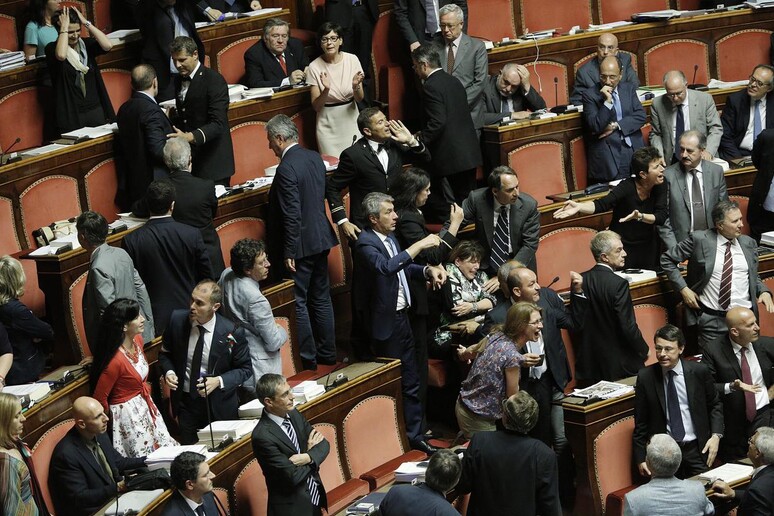Soon after center-left Premier
Matteo Renzi extended an olive branch to opponents, the Senate
on Friday cleared another hurdle by approving the second article
of his hotly contested Constitutional reform bill, which aims to
turn the Senate into a leaner assembly of local-government
representatives with minimal lawmaking powers.
The second article cuts the number of Senators from 315 to
100, of whom 95 to be chosen by regional councils and five to be
nominated by the president of the Republic. It passed with 194
votes in favor, 26 nays, and eight abstentions.
Yesterday, the Senate approved the first article of the
bill, stripping the Senate of most of its lawmaking powers and
concentrating them in the Lower House.
The bill is staunchly opposed by the anti-establishment
5-Star Movement (M5S), the leftwing SEL party, and the
anti-immigrant, separatist Northern League, with its progress on
the floor of the Senate stymied by filibustering and the
presentation of 7,800 amendments: 6,000 of them filed by SEL,
and 4,500 of them heaped on the first two articles of the bill
alone.
Tension over the controversial bill is high and lawmakers
have come close to blows on several occasions over the last two
weeks.
Ugly scenes late on Thursday culminated with a woman
Senator being taken to hospital after being knocked by a
parliament staff member trying to take down protest placards.
After attempts at mediation between the government and the
opposition failed to get any of the amendments withdrawn, Senate
Speaker Pietro Grasso this week began applying parliament's
kangaroo rule, which says that the outcome of voting on one
amendment counts for all similar amendments.
This made it possible to knock down over 1,800 of the
amendments on Tuesday and Wednesday, amid furious protests from
opposition lawmakers.
On Friday, lawmakers from SEL, M5S and the Northern League
walked out of the Senate in protest.
"In these conditions the M5S will not take part in any work
and we won't vote on any amendments," said Vito Petrocelli, the
M5S whip in the Senate, before putting on a gag.
SEL whip Loredana De Petris expressed similar sentiments.
"We are leaving because the conditions for democratic
debate are not guaranteed," said De Petris.
The SEL and M5S representatives eventually returned to the
Senate later in the day, but the League declined to rejoin.
The M5S ultimately announced it will "never participate
again" in anything to do with the reform bill, since its demands
are off the table and will never be met.
Renzi then indicated he is open to reviewing some aspects
of the bill, such as parliamentary immunity for Senators, the
rules for referendums, and who gets to elect the president of
the Republic, whose job is to guarantee that Italian politics
comply with the Constitution.
Currently in Italy, the president of the Republic is
elected to a seven-year term by a joint session of both houses
of parliament, plus 58 special electors appointed by the
nation's 28 regions.
ALL RIGHTS RESERVED © Copyright ANSA











